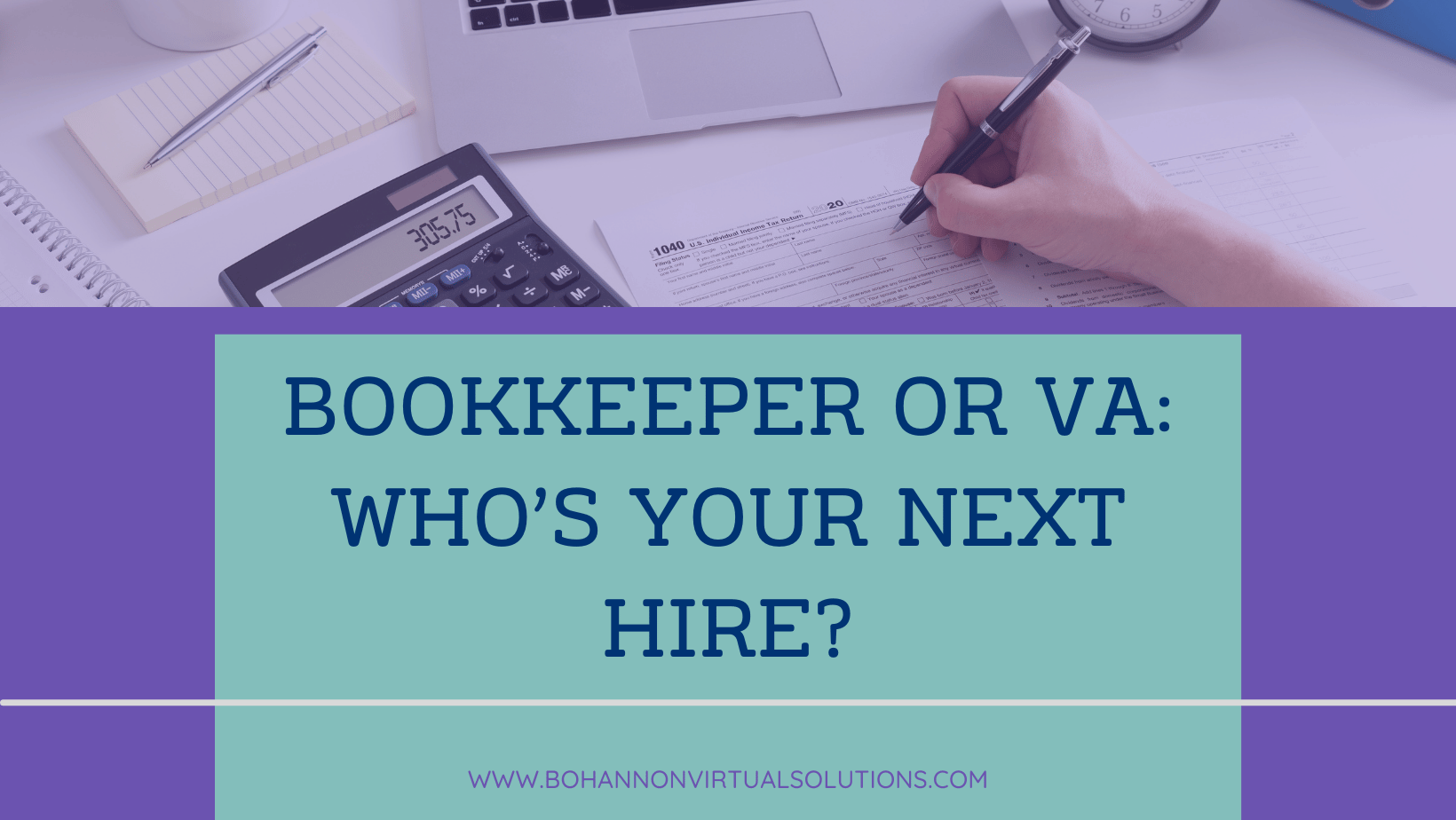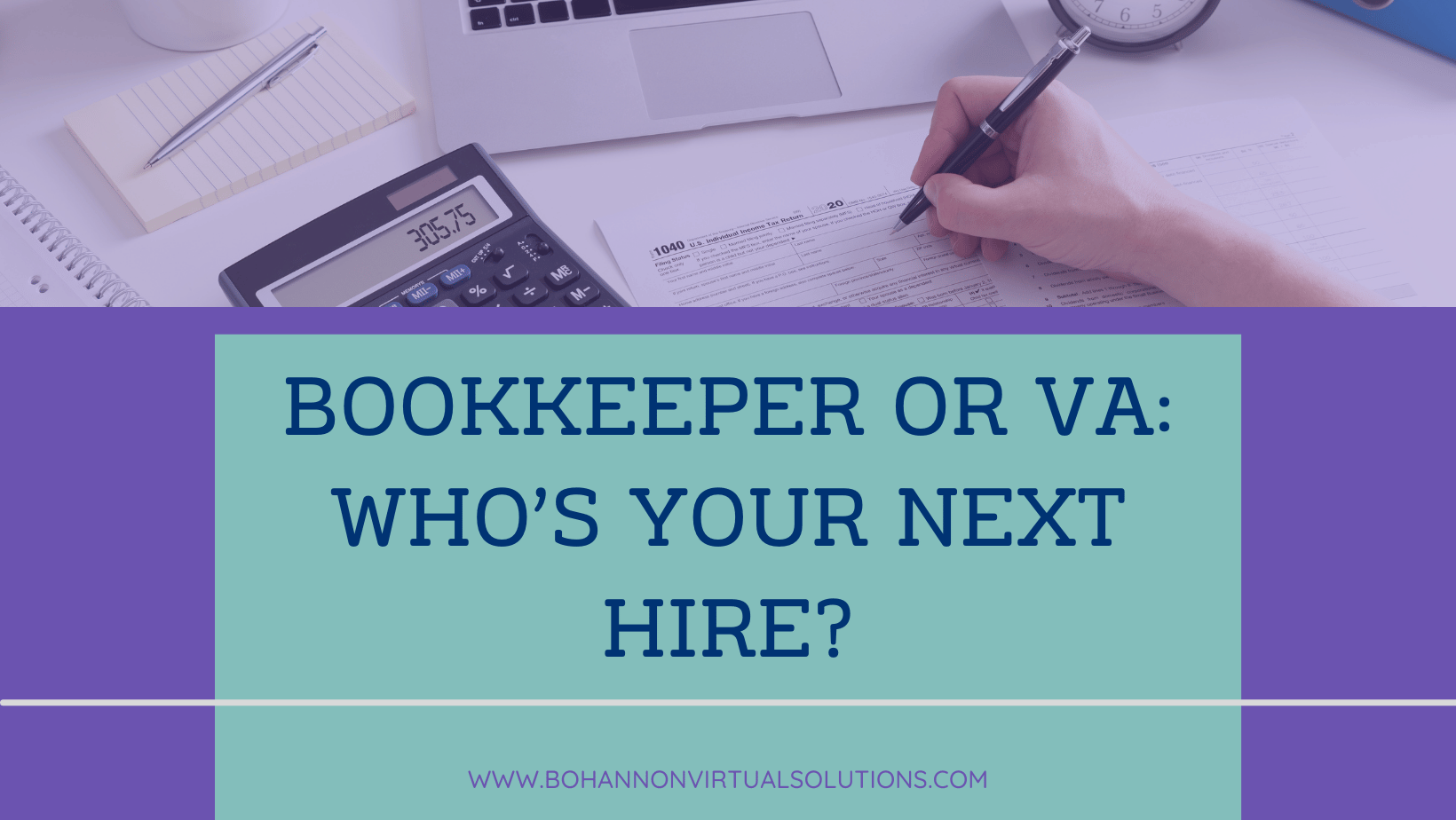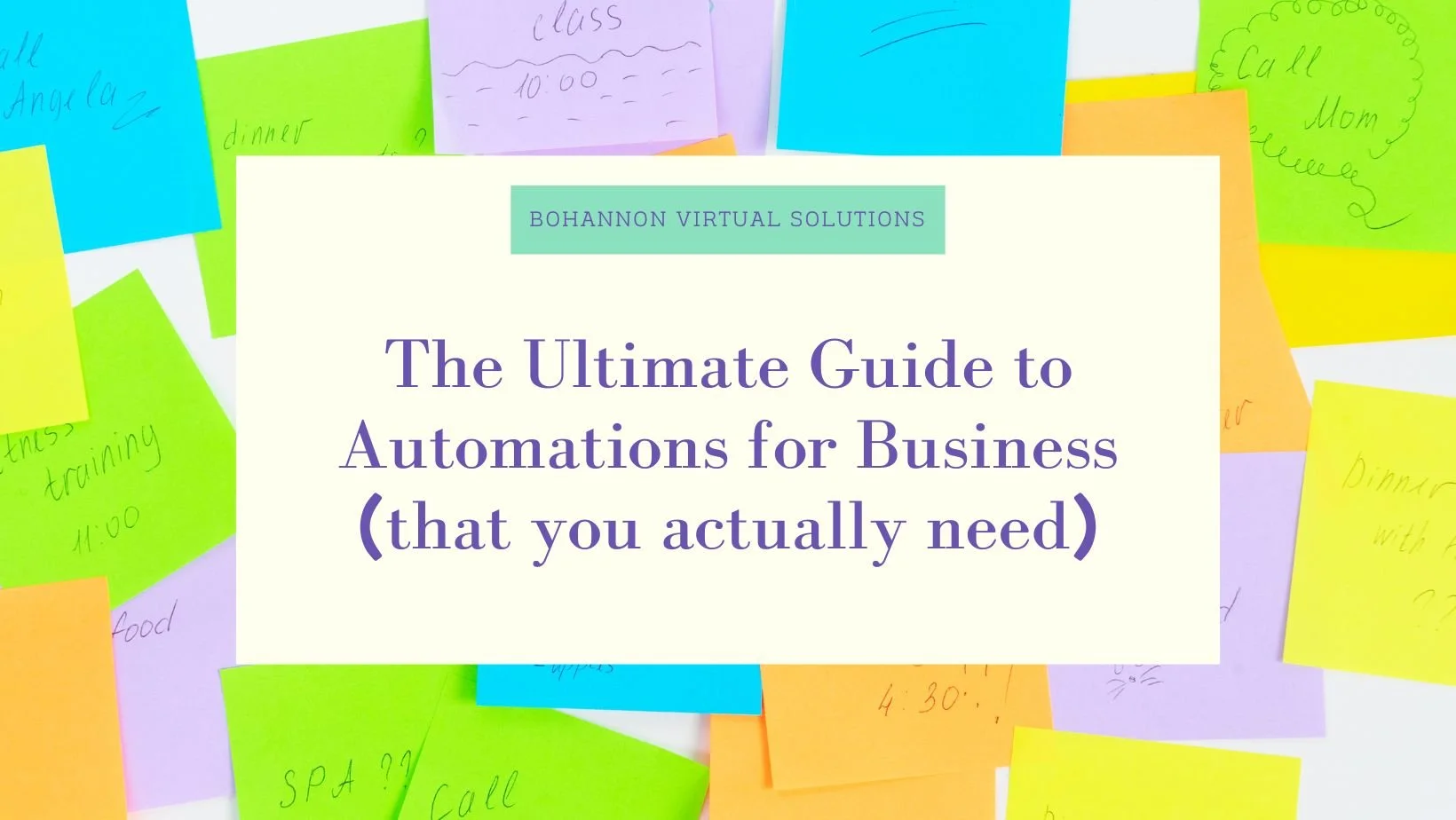The Benefits of a Bookkeeper Over a Bookkeeping Virtual Assistant
I've met more than 100 small business owners in the last few years and not a single one of them likes doing their bookkeeping, unless they are a bookkeeper. I mean, same. And while it's one thing to know you need or want financial support, figuring out who to hire is a whole other beast.
While I can provide insights into the role of VAs and OBMs, I only know so much about what a bookkeeper actually does. So I teamed up with Aneisha Velazquez of Yellow Sky Business Services to learn more about the benefits of a bookkeeper and how their role differs from a bookkeeping virtual assistant. Today, I'm going to share with you what I learned and how you can learn more about bookkeeping and having a designated bookkeeper from Aneisha.
Sign up for my newsletter, Business & Balance, and get my blog posts to your inbox every Wednesday along with my best ideas on all things systems, delegation, and spending more time doing what you love.
These RED FLAGS = You Need to Hire a Bookkeeper
If you're here, I'm assuming you've already thought about getting help with your finances. Here are Aneisha's top 3 signs that you need a bookkeeper:
You're stressed every tax season. And you are always filing an extension; not because of tax strategy, but because you need more time to pull your numbers together.
You haven't opened your bookkeeping software (i.e. QuickBooks, Xero, Wave) in months. You keep mentally rescheduling that task for some future time that just never comes.
Your account keeps asking your for things you don't understand. The back-and-forth is frustrating and makes you feel like you're doing everything wrong.
Or maybe it's something else. Something a little less chaotic and a little more desire.
Maybe you just want tax season to go more smoothly.
Maybe you want your business to feel less chaotic.
Maybe you're ready to look ahead and make some bigger plans.
Basically, the benefits of a bookkeeper are gaining financial clarity and calm whether you're feeling "behind" or not. Bookkeeping is the foundation of your finances and hiring a bookkeeper is the place to start when it comes to managing your business money.
Understanding Bookkeeper Duties and Responsibilities
Again, let's start with the basics and then get into the deep stuff. Just like virtual assistants, and any other service provider, really, bookkeeper services differ from bookkeeper to bookkeeper. In general, here's what a bookkeeper does:
records transactions
reconciles bank statements & accounting software
monitors cash flow
generates financial reports
provides feedback about overall financial health and decisions
What a Good Bookkeeper Can Do for Your Business
With any hire, you should consider how the investment you make into the service provider will be returned. When I asked Aneisha about the benefits of a bookkeeper and what a bookkeeper can do for your business, here's what she had to say:
"For most business owners, the first time you work with a bookkeeper, it’s to get caught up and organized. And honestly, that’s usually the most overwhelming part.
I’ve seen the shame about being 'behind,' the panic about taxes, the stress of not even knowing where to start. If that’s you, you’re not alone. I keep the process simple and clear, so you can move from tangled to organized without burning out.
Here’s what it looks like:
Onboarding
We start with a call where I walk you through what I need, how to send it securely, and what to expect. I use a secure client portal for document uploads and messages, so you don’t have to hop on a call every time I need something. This stage requires heavy client involvement but I’m here to guide you through it.
Catch-Up
Once I have what I need, I start the catchup part. I go through your financial records, organize income and expenses, and start putting together the full picture. This stage can take about 4-6 weeks, depending on how far behind things are and how complex your business is. I’ll ask a lot of questions — not because you did anything wrong, but because I’m piecing together a story from past activity. That detective work is part of the process.
Ongoing Maintenance
Once things are caught up and clean, we move into monthly maintenance. I’ll handle the ongoing bookkeeping, and your input becomes lighter — just answering occasional questions and sending documents if needed.
Throughout the year, if questions come up, you can reach out. I keep communication flexible:
Quick questions get an email
More complex ones come with a Loom video
And we can always hop on a monthly call if you prefer live conversations or need deeper support
My goal is to make this feel manageable and not like another stressful item on your to-do list."
The benefits of a bookkeeper go beyond just "data entry" and include reducing shame, stress, and overwhelm around your finances.
Bookkeeper Tasks vs. Accountant/CPA Duties
There are a lot of different service providers offering financial services. Sifting through each of them on Google and LinkedIn will leave you frustrated and confused about whose who and who you need to help you with your business.
Aneisha helped me understand the differences between bookkeepers and accounts by breaking it down for me into two main categories.
Day-to-Day Financial Tracking
This is where a bookkeeper's tasks falls and includes:
invoicing
bill pay
tracking expenses
tracking cash flow
organizing receipts
keeping financial records organized neatly
so you can find what you need when you need it. Basically, your bookkeeper keeps your financial engine running smoothly.
Taxes and Planning
This is what a tax professional or accountant usually focuses on. They deal with all things taxes:
income tax
sales tax
payroll tax
business owner's personal tax situation
planning for tax time
tax strategy
so that you have everything you need for filing taxes, getting advice about your tases, and a plan for what's coming next.
Where it Gets Complicated
Sometimes, the lines get blurred.
You might have an accountant that does bookkeeping.
You might have a bookkeeper who is trained in tax prep.
There are accountants that don't do taxes at all.
Here are a few more tips Aneisha gave me that might be helpful when looking for financial service providers:
Enrolled Agent (EA) - a federally certified tax expert, but not a CPA who can help you with your taxes.
Certified Public Accountant (CPA) - is often for publicly traded companies or high-regulation industries. You DO NOT need a CPA to file your small business taxes.
The best thing you can do is make sure whomever you hire is able to communicate with the other members of your team and understand your business goals and motivation.
TLDR; Bookkeeper Duties vs Accountant Tasks
Bookkeeper - go-to for daily-to-day financial tracking and organization
Accountant / EA / Trained Bookkeeper - tax preparation and planning
Benefits of a Bookkeeper Over a Bookkeeping Virtual Assistant
There's a lot of noise in the online business space and advice that's not always realistic, practical, or good. And so the first person a lot of business owners plan to outsource their bookkeeping to is a virtual assistant, because there are so many voices out there saying that a VA can do everything and anything.
This is not to say that VAs are not amazing; I LOVE VAs. But I love VAs who do their job very well because it's something they are really good at even more. Frankly, most VAs are not trained in bookkeeping. Sure, they can upload your receipts, forward your purchase emails to your bookkeeper, and communicate with clients about invoicing, but understanding how expenses should be categorized, what should be included in your books for optimization, and communicating with your accountant or tax profession, that's out of most VAs' wheelhouse.
We Highly Recommend You Have a Designated Bookkeeper
Bookkeepers have training in finances and bookkeeping. They watch the news and updates regarding tax laws and money stuff you need to know. They do training and professional learning in the finance space only. All of this means you will have accurate financial records and full legal compliance.
The benefits of a bookkeeper who only does bookkeeping are:
time saved because they know exactly what they are doing.
Fewer errors in the long-term.
Audit and tax support from someone who knows and understands exactly what you need.
Financial clarity that supports growth and decision-making.
Peace of mind knowing the person handling your money knows exactly what they are doing.
The Role of a Bookkeeping Virtual Assistant (and Where They Fit In)
If you find a VA who is trained in bookkeeping, by all means, use them for bookkeeping! But make sure they can handle everything you need before you start having them take over bookkeeping tasks and that they know more than just how to slightly use Quickbooks.
You can also have a VA assist your bookkeeper with bookkeeping tasks. This would be having them track and upload receipts, upload financial documents, and any other light admin work around bookkeeping. This will greatly reduce the time needed from your bookkeeper.
But I want to again advise against having your tech VA do your bookkeeping. It may lead to missed transactions, improper reconciliation, and improper categorization. It could leave your business at higher risk for audit and owing more than you should due to admin errors that would have been seen by a bookkeeping service.
What a VA can do: receipts, uploading docs, light admin around bookkeeping.
Want to know more tasks a VA can do? Click here.
My Hot Take: You Should Hire a Bookkeeper AND a Virtual Assistant
Knowing what I know now, my first hire would have been a bookkeeper and not a virtual assistant. My next hire would have been a VA.
Bookkeeping is the foundation of financial clarity. It's nearly impossible to make smart financial decisions if you do not have financial clarity. A bookkeeper will help you organize your finances and prepare your books for tax season.
A virtual assistant can help you organize the documents and send them to your bookkeeper, but should not be doing books unless they have extensive knowledge of bookkeeping.
Hiring a bookkeeper is not only an investment in your business, but an investment in calm and confidence.
Hire a bookkeeper who gets you, who won't shame you, and who will guide you through your financial circumstances to meet your financial and business goals.
Meet Aneisha
Aneisha Velazquez is a financial detangler and clarity guide for different-brained business owners - and a thought partner for anyone rethinking their relationship with money, systems, and possibility.
With a background in communication and a gift for making the complex feel approachable, she helps clients untangle financial messes, soften shame, and take their next steps with calm and confidence.
More from Aneisha & Yellow Sky Business Services
You can find money and bookkeeping tips on Aneisha's bookkeeping business blog at yellowskybusiness.services/blog. She also shares free practical how-to videos on her business YouTube channel: @YellowSkyBusiness.Services.
Lastly, if you’re curious about what she's exploring behind-the-scenes, including new money-related offers and ideas, you can follow along at her personal site: aneishavelazquez.com.
Frequently Asked Questions (FAQs)
What are the benefits of a bookkeeper?
A bookkeeper manages your day-to-day finances and ensures that your business’s financial health is good. They will help you understand your finances better so you can make more informed financial decisions.
What are the advantages of bookkeeping?
Having accurate financial records
Having financial documents organized and ready for tax season
Understanding cashflow
Understanding revenue, profit, and expenses
What are the strengths of a bookkeeper?
Bookkeepers only work with the financial side of businesses so they are skilled in various finance-related softwares, tax basics, how to organize your financial documents, and growing their knowledge of all things business tax related and finances.
What are bookkeeper prices and bookkeeping fees?
This varies widely from bookkeeper to bookkeeper. For a good bookkeeper for a small team, you can expect to pay between $700-$1,000 a month for general services. If you have a larger team or need more specialized services, it is not uncommon to see prices closer to $2,000 a month. It is best to write out what services you need and research bookkeepers that offer those services and request quotes directly from them. If you have a VA already, it may be a good idea to ask how you can utilize your VA alongside the bookkeeper to keep your cost lower if that is a concern.





















